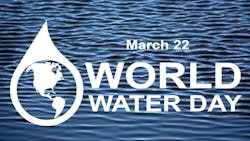
Jon Freedman of Veolia Water Technologies & Solutions addresses water management challenges and more in this World Water Day 2024 Q&A.
How is World Water Day highlighting and addressing water management challenges, especially in water-stressed regions?
World Water Day plays a pivotal role in drawing global attention to the urgent need for sustainable water management and ensuring everyone has access to safe water. This day is all about waking the world up to water-related issues — whether it's water scarcity, poor quality or lack of access — and the ways we can solve these challenges.
It's a big deal because water is a fundamental right, yet so many people are left dry. According to the World Health Organization, about 2 billion people live in countries experiencing high water stress, and 4 billion experience severe water scarcity for at least a month each year. World Water Day helps us rally together — governments, organizations and individuals alike — to develop creative solutions and push for the kind of changes that secure water for everyone.
This day serves as a platform to educate communities, influence policies, and inspire action to tackle the global water crisis. Bringing together governments, organizations and individuals fosters collaboration and innovative solutions to ensure water security for all.
Can you provide some examples of initiatives inspired by World Water Day?
Numerous initiatives and projects worldwide aim to improve water accessibility, quality and sustainability. Veolia Water Technologies & Solutions has been at the forefront of many of these initiatives, contributing to the global effort to improve water management. In India, for example, our collaboration with national efforts aligns with the National Water Mission and National Water Policy, focusing on water conservation, recycling and efficient usage practices.
Veolia has also played a significant role in water donation projects in places like Nairobi, Kenya, aimed at providing clean water to communities in need. Such efforts are recognized by awards like the WateReuse Association's Global Industrial Award, which celebrates innovative water reuse and sustainable water management projects, further highlighting the global commitment to addressing water issues inspired by World Water Day. In addition to engaging with communities to help them address their water challenges, we also played a key role in creating an Industrial Reuse Champion Award, recognizing the efforts of companies that take steps to help alleviate water scarcity.
Which strategies are most effective in combating water scarcity and improving water quality?
The key to making a real dent in water scarcity and quality issues is a blend of advocating for supportive policies, embracing technological innovation and engaging all stakeholders. Promoting water reuse has been a game-changer, especially as technologies for water recycling become more affordable and accessible. For example, India's National Water Policy is pushing for the recycling and reuse of municipal wastewater, which is a big move towards sustainable water management.
In places like California, we're seeing initiatives like the Pure Water San Diego Program, which uses advanced purification technologies to turn treated wastewater into drinking water. It's all about collaborative effort — from government bodies to NGOs and the communities themselves — pooling resources and knowledge for effective solutions.
To ensure widespread implementation, it is imperative to adapt solutions to the unique needs of water-stressed and developing areas, incorporating low-cost technologies and community training programs to ensure sustainability.
Are there any current water policies that stand out to you in terms of their impact on sustainable water management?
Effective water policies like the Infrastructure Investment and Jobs Act (IIJA) in the U.S., which allocates $50 billion towards modernizing water infrastructure in the U.S., with much of the money targeted towards underserved communities, as well as India's National Water Mission and Policy, focusing on conservation and recycling, demonstrate significant progress in sustainable water management. These policies are instrumental in enhancing water access and encouraging water-efficient practices, reducing pressure on freshwater resources.
While these policies mark progress, their implementation reveals the need for a more nuanced understanding of the challenges faced. The effectiveness of such initiatives can be enhanced by greater global cooperation and knowledge sharing in disseminating successful strategies and innovations across water-stressed regions. As we move forward, it's imperative that policies evolve to be more adaptive and holistic, incorporating climate resilience, green infrastructure investments, and community-led management efforts to ensure sustainable water access and usage for future generations.
How are communities, especially those facing water stress, adapting to climate change's impact on water resources?
Communities and nations under water stress are adopting multifaceted strategies to adapt to the impacts of climate change on water resources. These strategies range from policy-driven water conservation and water reuse efforts to significant investments in innovative technologies that enhance water supply and efficiency. For instance, progressive water pricing structures incentivize conservation, while advanced irrigation techniques improve agricultural water use.
Nature-based solutions are also pivotal, with initiatives aimed at combating desertification, promoting rainwater harvesting, aquifer recharge and reforestation to replenish groundwater and enhance water security. The involvement of local communities is essential in these efforts, as demonstrated by projects that construct raised tube wells to prevent saline intrusion into groundwater.
International cooperation enhances these adaptation measures, facilitating the exchange of knowledge, building capacity, and funding projects that improve flood resilience and water security. By integrating policy reforms, technological advancements, natural solutions, community engagement and global cooperation, water-stressed regions are effectively increasing their resilience to the changing climate's effects on water resources.
Looking ahead, what innovations in water purification, desalination, or wastewater treatment excite you the most?
We’ve already developed a number of game-changing water technology solutions that promise to fundamentally change our approach to how we source, use and renew our water supplies worldwide in sustainable ways. The critical next step is to advocate for and support policies that will accelerate the adoption of these technologies, ensuring they can make a meaningful impact on our water sustainability efforts.
The cost reductions in desalination are making it increasingly viable to turn seawater into freshwater in coastal communities facing scarcity. These reductions are linked to energy optimization, which also has an impact on environmental footprint. And new wastewater treatment systems can recycle sewage into potable drinking water supplies. The possibilities for reusing our limited freshwater are amazing.
Affordable household and community-scale purification devices are also being developed for underserved areas with little infrastructure. As these innovations become more widely accessible and affordable, I really think they'll be absolute game changers for addressing water insecurity, especially in climate-vulnerable regions.

